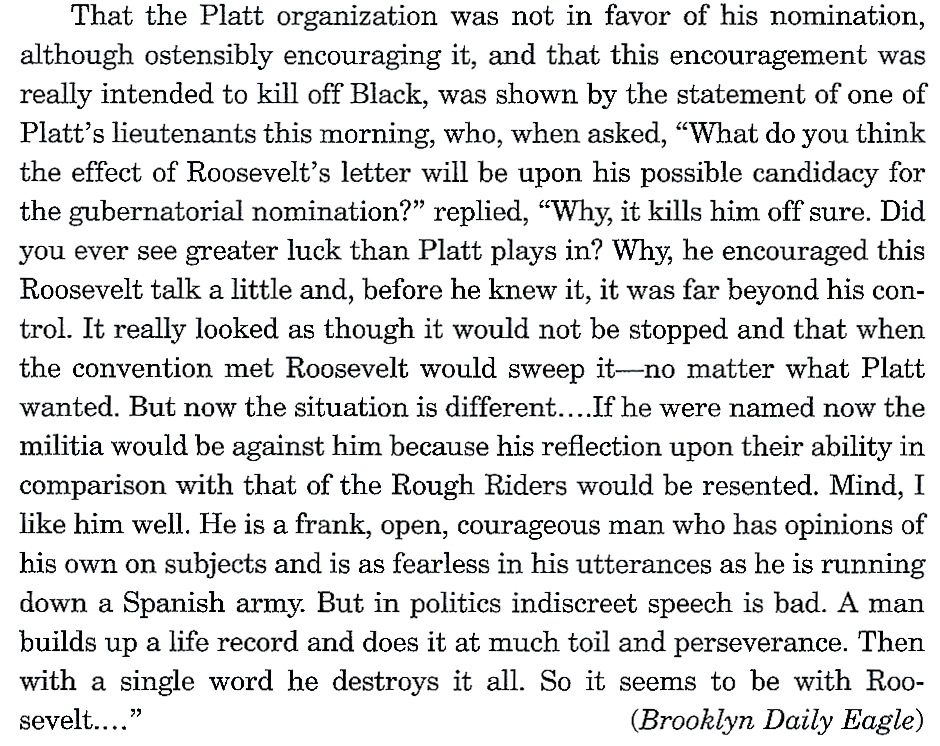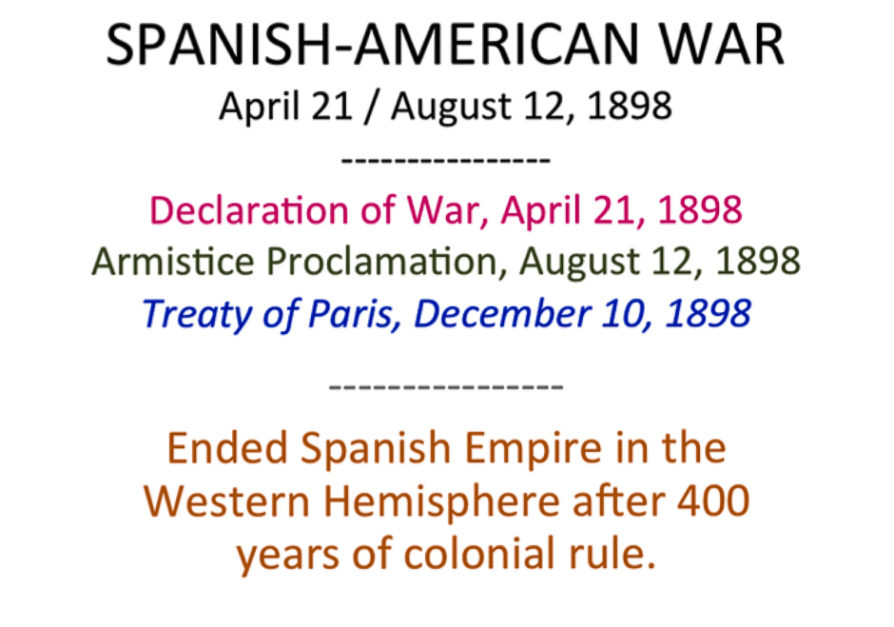
———————————–
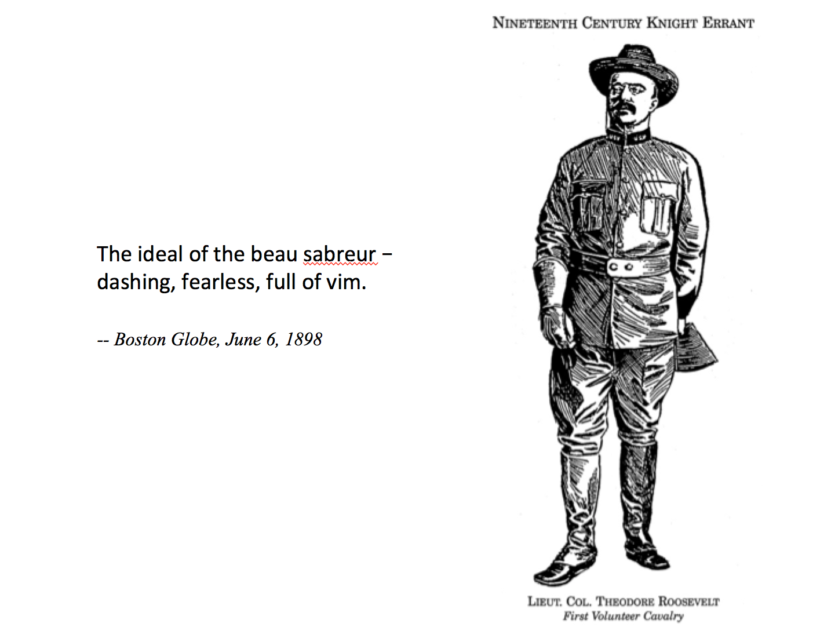
July 1, 1898 — Battle of San Juan Hill (& Kettle Hill) — Col. Roosevelt & the Rough Riders achieved national fame by leading the charge against Spanish forces in this decisive battle of the Spanish-American War. Theodore Roosevelt would later refer to this experience as the “crowded and glorious hour of my life.”
———————————–
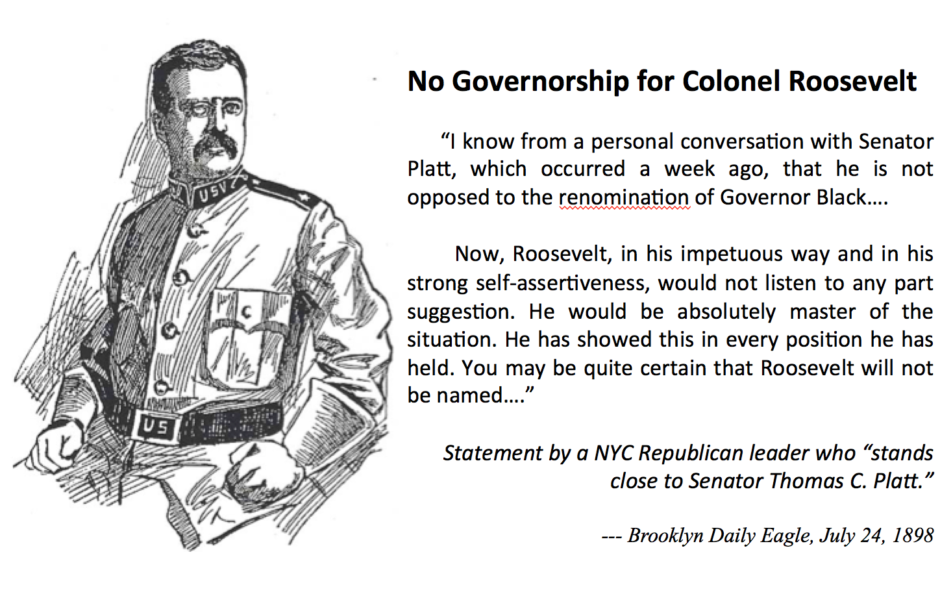
Senator Thomas C. Platt was known as the “easy boss” and exercised extraordinary power in the Republican Party of New York State.
———————————–
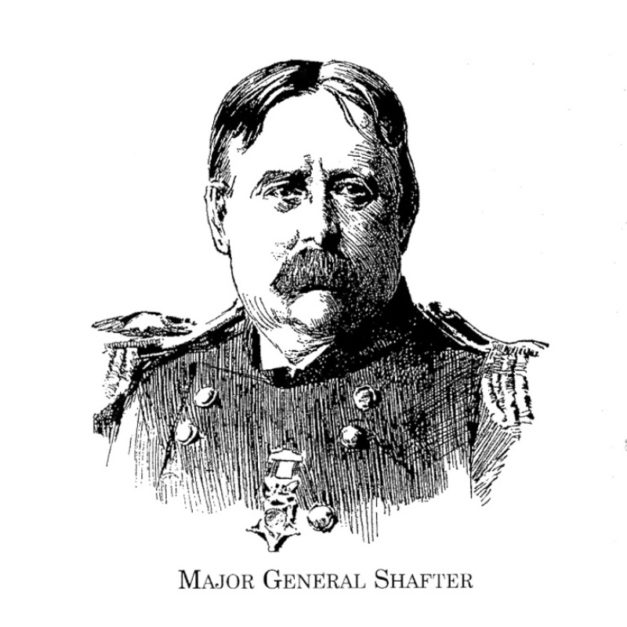
General Shafter’s Fifth Army Corps — 22,500 soldiers in Cuba, including 500 Rough Riders, with 7,000 soldiers at southern posts in the United States.
———————————–
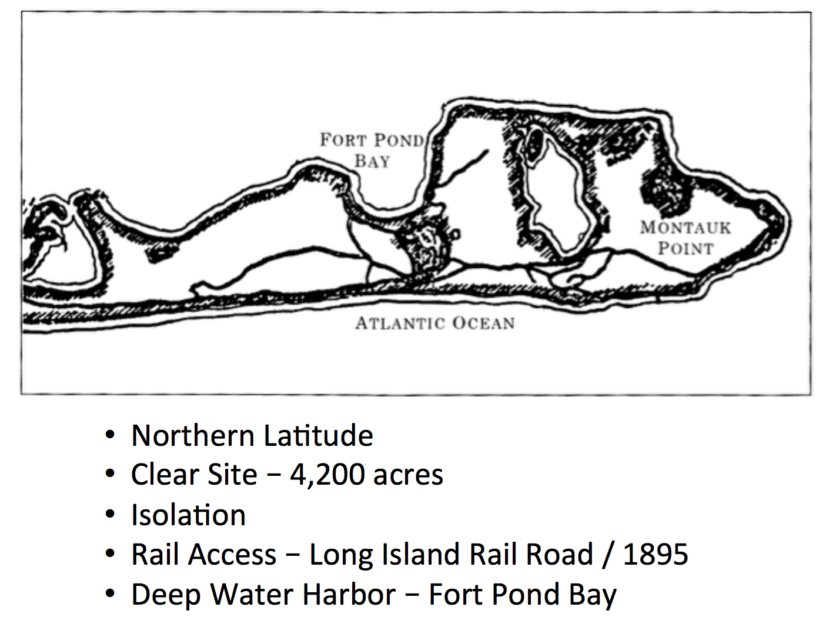
These were the main reasons Montauk Point was chosen as the site for the Quarantine Camp.
———————————–
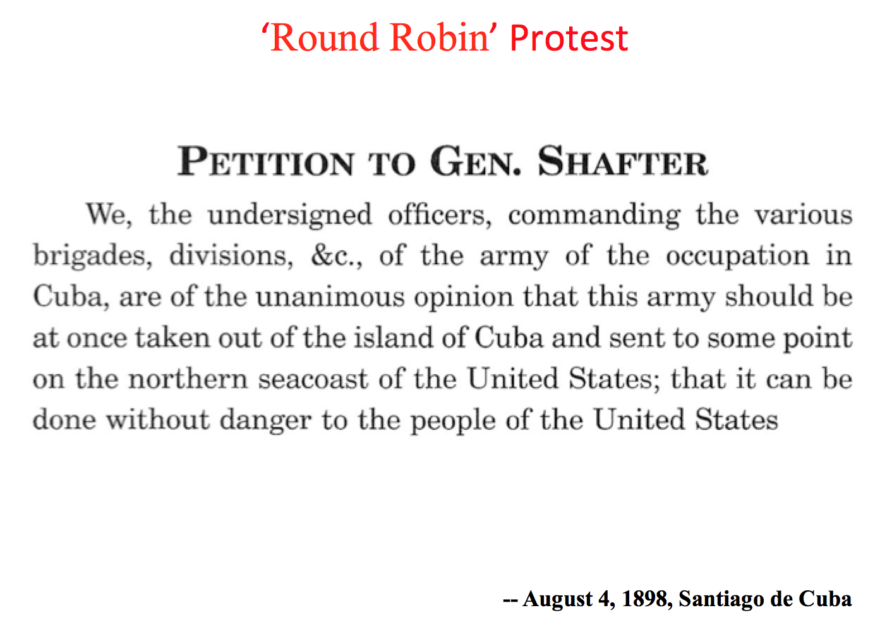
This was an unprecedented protest of an order from the Secretary of War.
———————————–
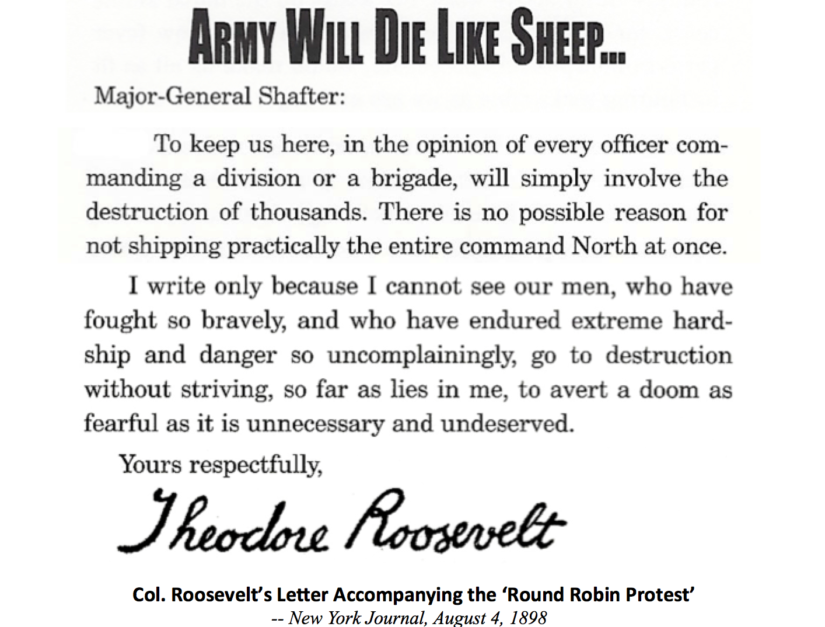
Accompanying letter from Col. Roosevelt, published in newspapers nationally the next day (August 4, 1898). Note that the Round Robin petition and Roosevelt’s accompanying letter are addressed to Gen. Shafter — these documents were intended for the Sec. of War. When the signed documents, however, were handed to Gen. Shafter — according to one account — they were pushed into the hands of the Associated Press, and were published nationally the next day. Note also that the choice of headline and position of the letter in the paper were editorial decisions — this appeared prominently on the front page of William Randolph Hearst’s New York Journal.
———————————–
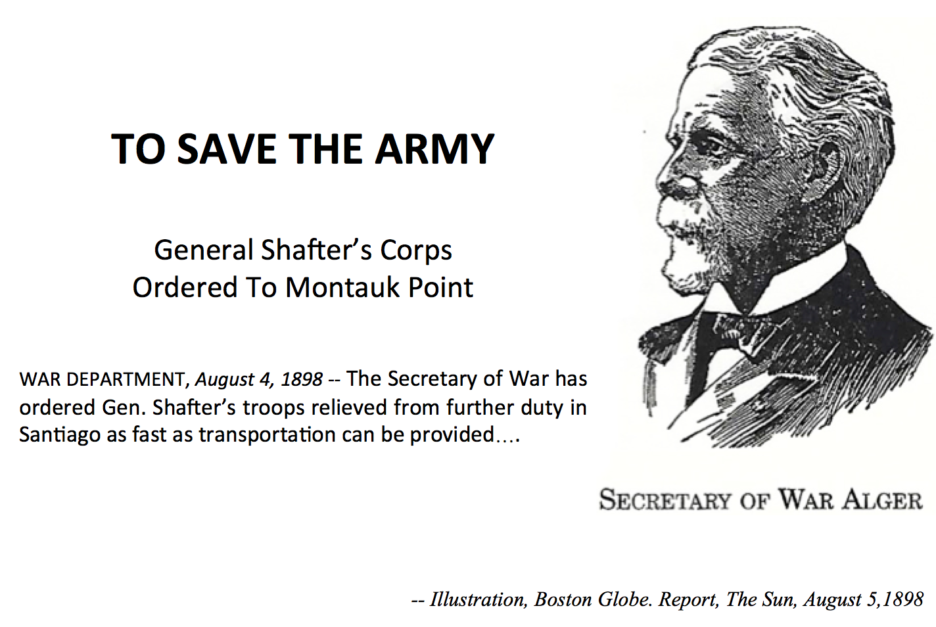
Secretary of War Alger first saw the Round Robin Protest in the newspapers — hours before he received the telegram from Gen. Shafter in Cuba.
———————————–
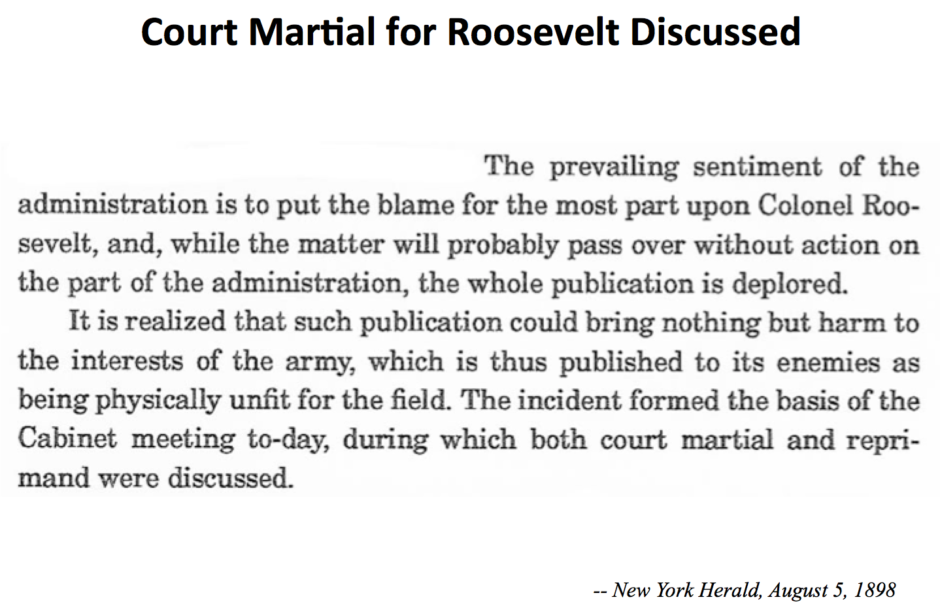
No court marshal or reprimand of Col. Roosevelt occurred, but the War Department did not recommend Roosevelt for a Medal of Honor in leading the charge at San Juan Hill. Col. Roosevelt, however, was posthumously awarded the Medal of Honor by President Clinton on January 16, 2001, largely due to the efforts of Dr. John A. Gable, Executive Director of the Theodore Roosevelt Association. Note, also, that Roosevelt’s eldest son, Brigadier General Theodore Roosevelt Jr., was awarded the Medal of Honor, posthumously, for his actions on June 6, 1944.
———————————–
— August 5, 1898
———————————–
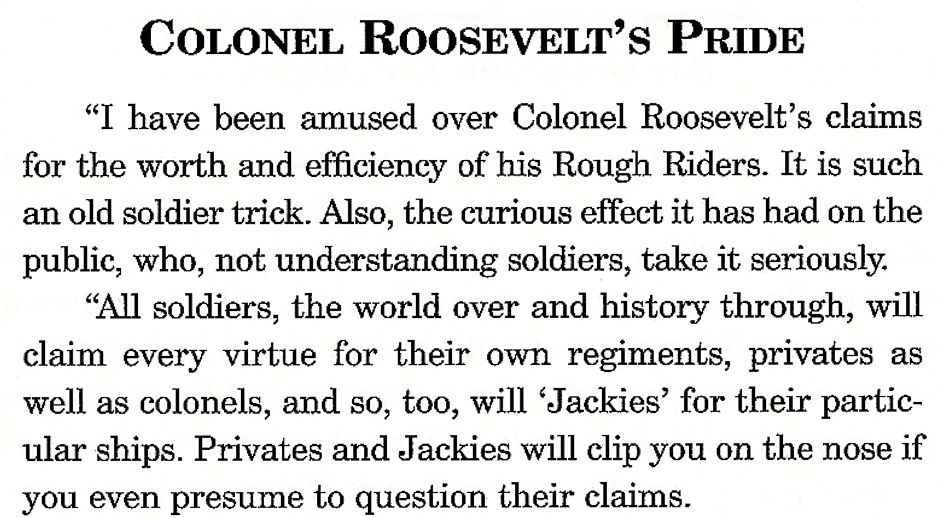
— Frederick Remington, Harper’s Weekly, August 27, 1898
———————————–
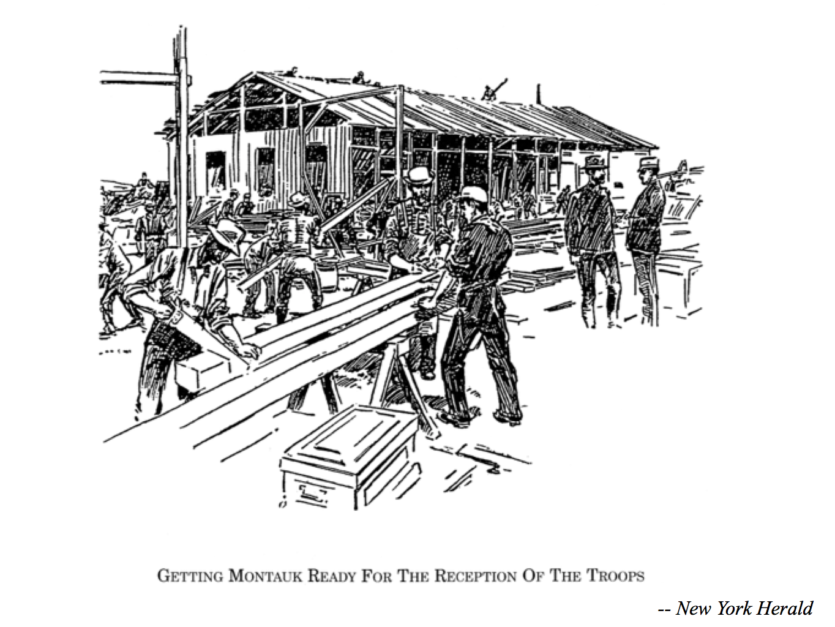
The Long Island Rail Road had offered the U.S. Government 6,000 acres in Montauk for the encampment, at no charge. 4,200 acres were accepted for the camp. The LIRR had also offered to build piers on Fort Pond Bay, dig wells for water, build a railroad station — all to accommodate the 29,500 soldiers expected to begin arriving by transport & train. The Long Island Rail Road performed flawlessly throughout the encampment, transporting more than 50,000 soldiers & visitors, thousands of horses / mules, and tons of supplies.
———————————–
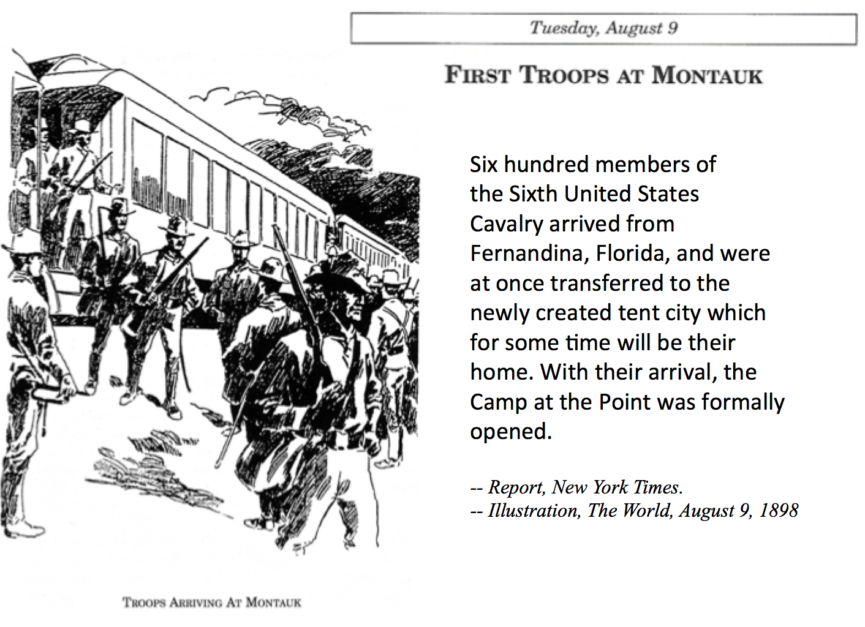
———————————–
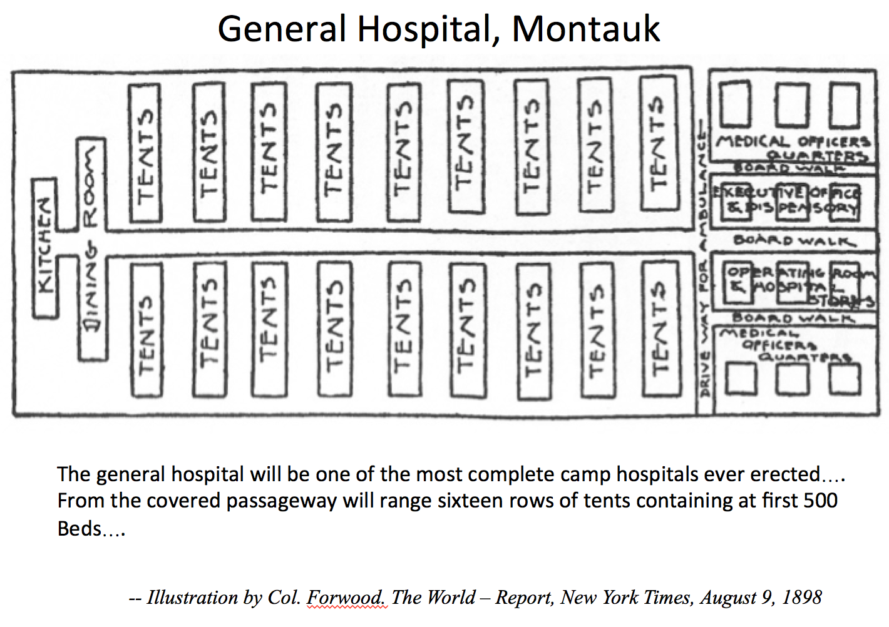
The General Hospital was located where Montauk Downs is today. A Detention Camp with Hospital was located where Montauk Manor is today. Soldiers, on arrival, were quarantined in the Detention Camp for four days — the healthy soldiers then moved to their regimental campsites, sick soldiers were either transferred to the General Hospital or, if conditions were severe, remained in the Detention Hospital.
———————————–
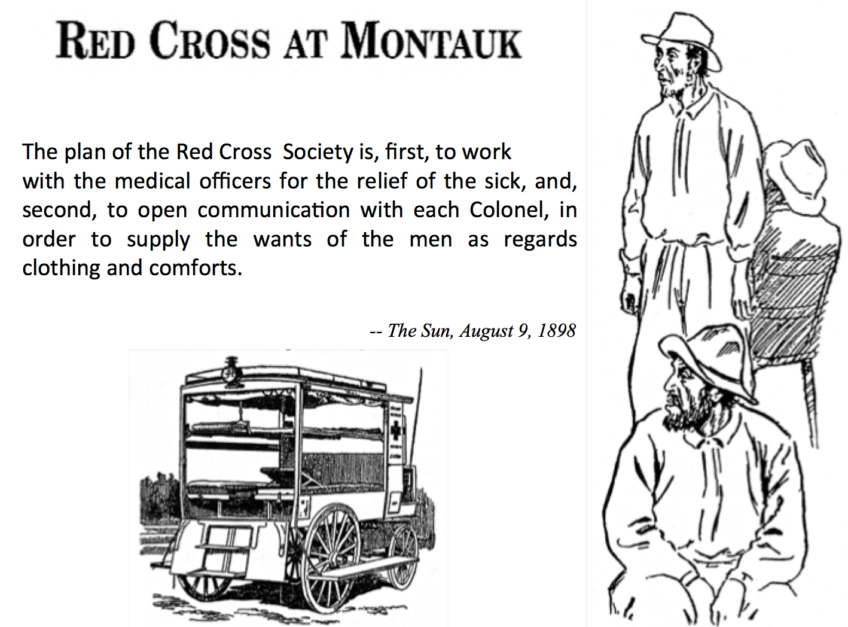
The American Red Cross — founded in 1881 — was contracted by the U.S. Government to provide nurses to the camp hospitals, which were normally staffed by male nurses. The encampment at Montauk became the first opportunity for the American Red Cross to fulfill its original mission. The Red Cross established camp headquarters in a vacant cottage in the Montauk Association — it transported supplies to Fort Pond Bay on the Red Cross yacht.
———————————–
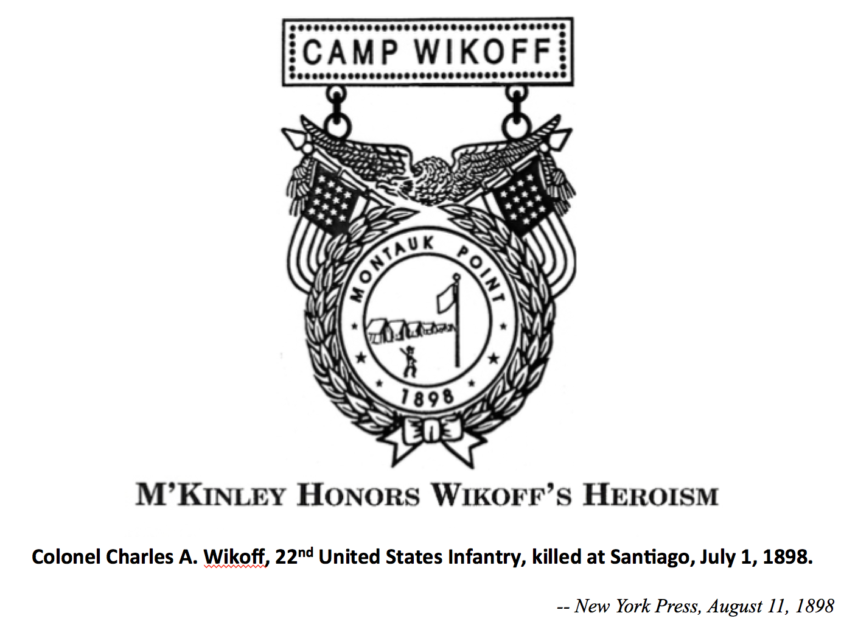
———————————–
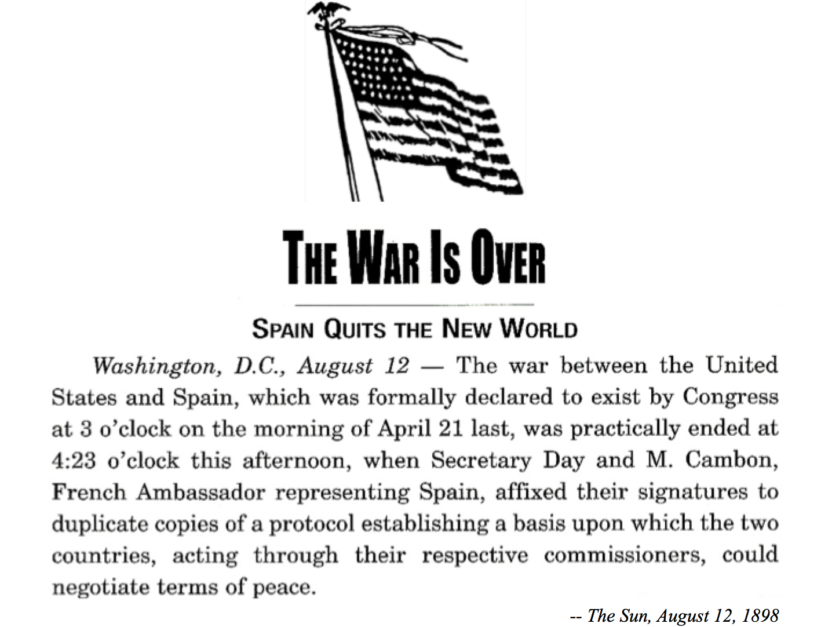
———————————–
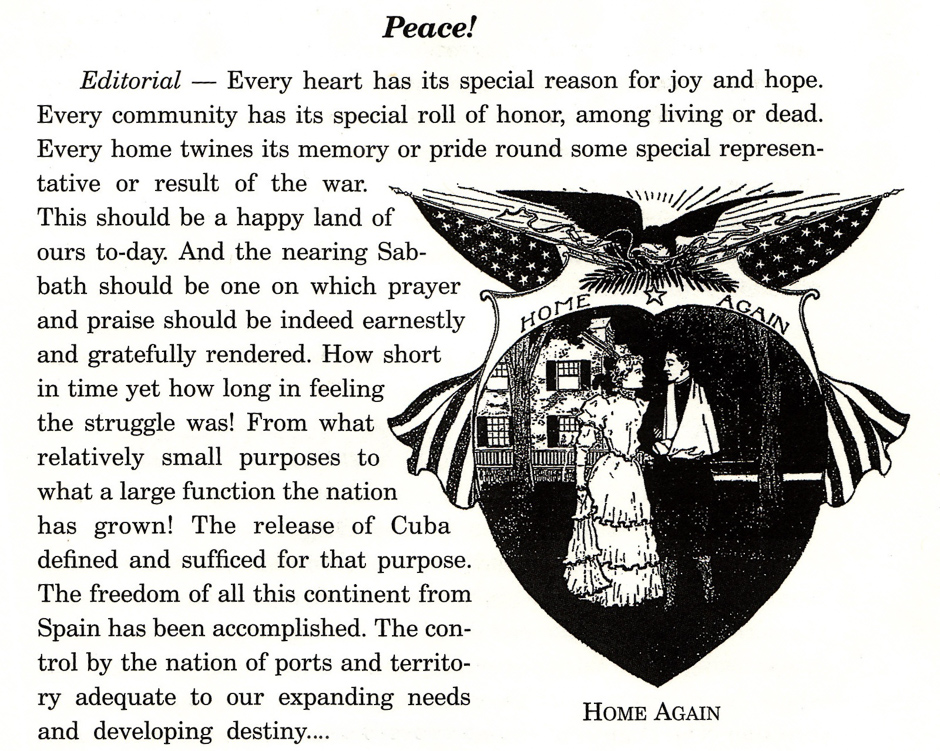
— Editorial, Brooklyn Daily Eagle, August 13, 1898. Illustration / Boston Globe.
John Howard Payne’s ‘Home, Sweet Home’ was a popular song on the transports and in the camp.
———————————–
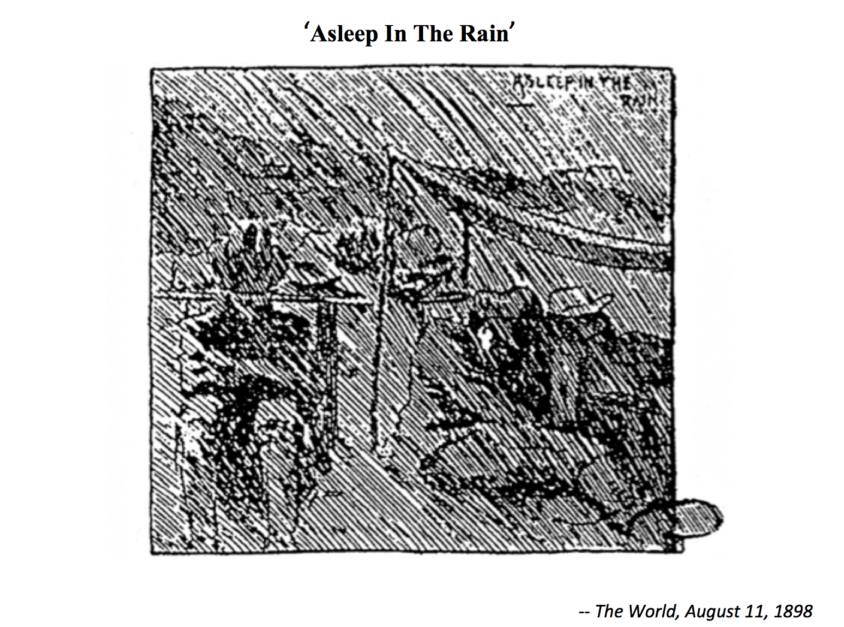
Illustrations were used in the daily papers at this time because halftones could not be ready by press time, except in the Sunday editions of some daily papers. Photos were sometimes, however, the basis for illustrations. The scene in this illustration would have been difficult to capture on film.
———————————–
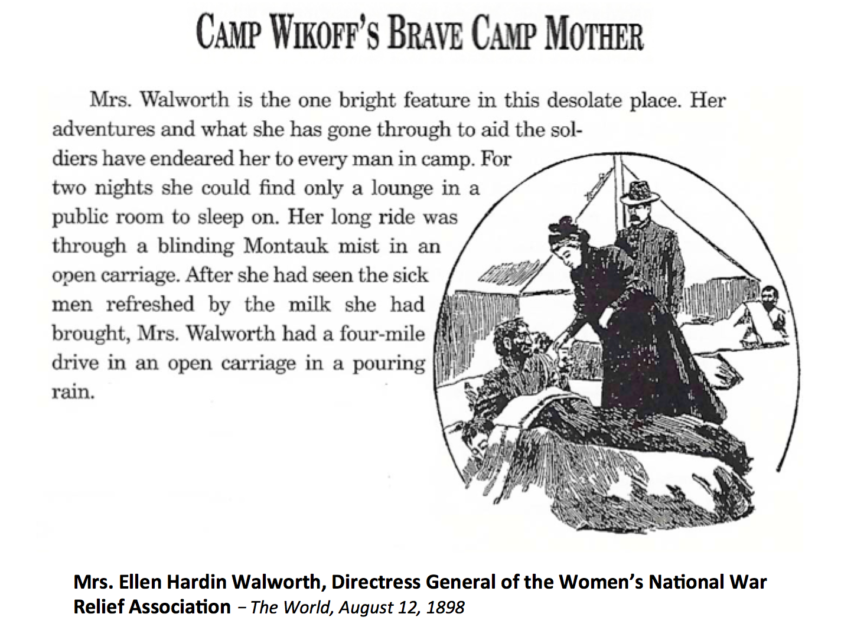
———————————–
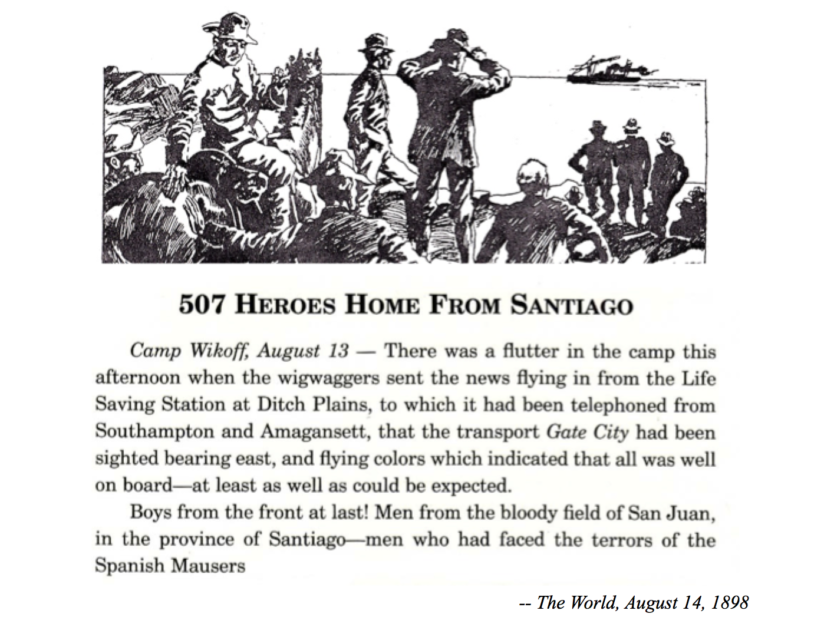
The Gate City was the first of more than 40 transports coming from Santiago de Cuba.
———————————–
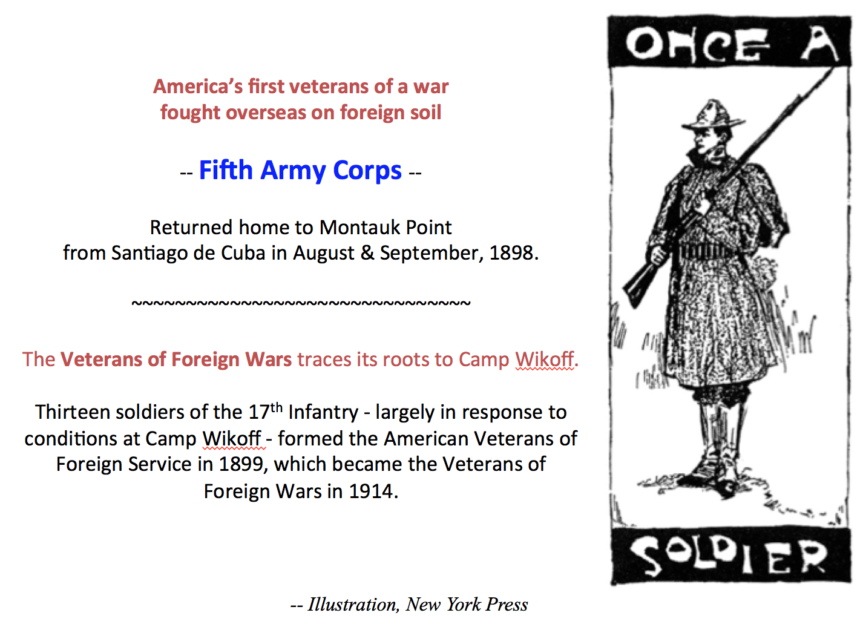
The soldiers of the 17th Infantry were encamped at what is now Shadmoor State Park.
———————————–
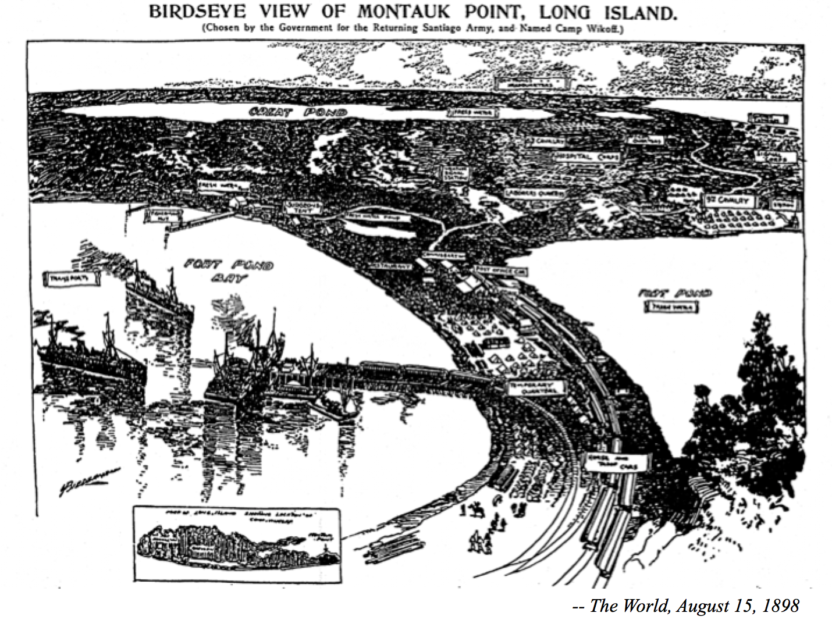
This double-page spread appeared in Joseph Pulitzer’s The World newspaper. Note the Iron Pier, with rail access, that the Long Island Rail Road built for the returning troops.
———————————–
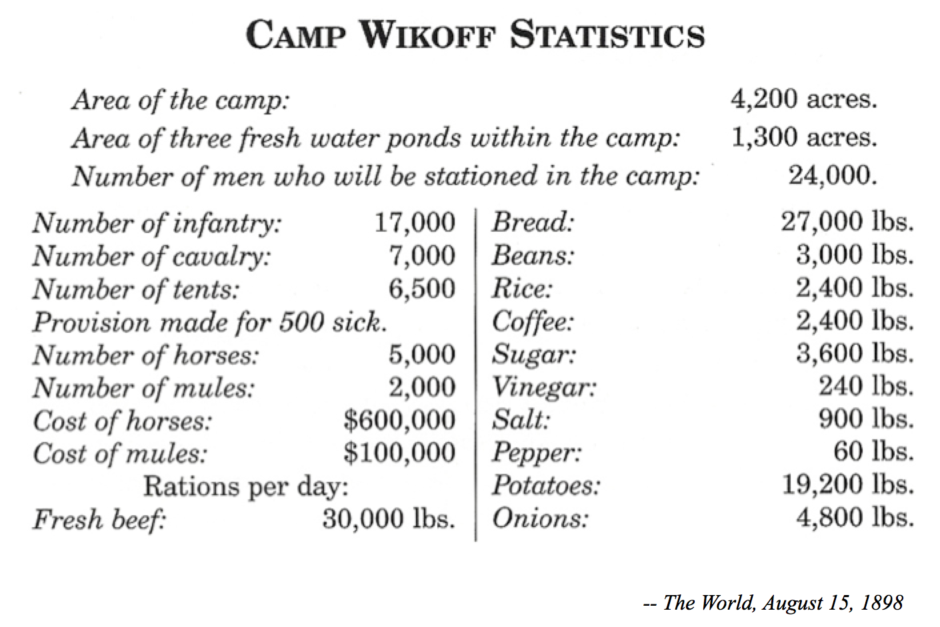
The War Department expected that Camp Wikoff would remain active for six months.
———————————–
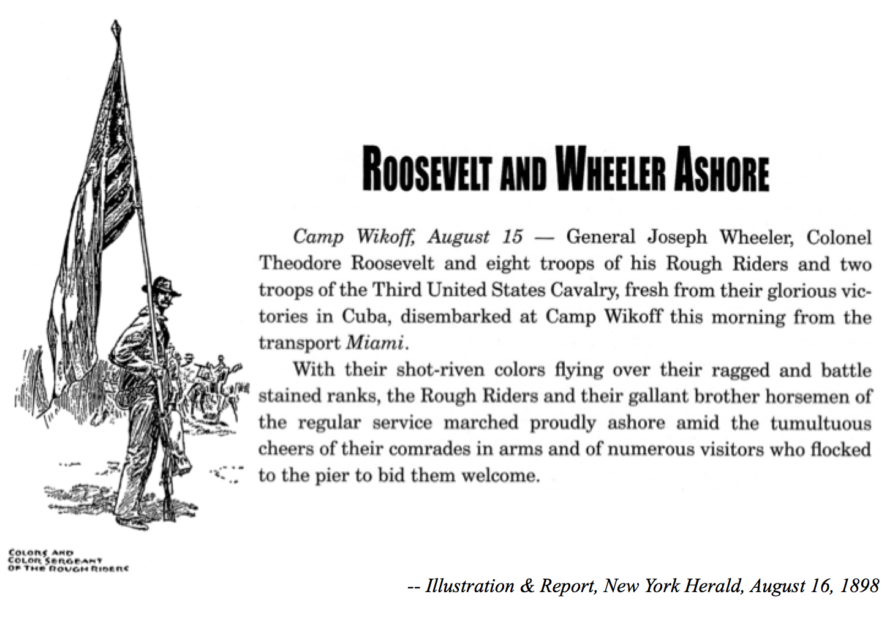
———————————–
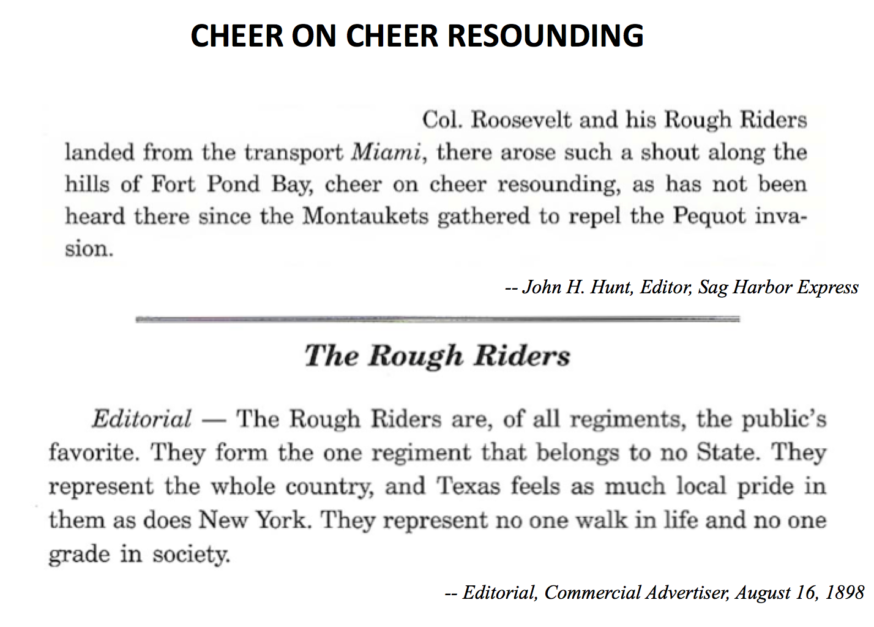
The general public had access to Camp Wikoff, except for the Detention Camp. Civilians greeted the arriving transports and visited the regimental camps.
———————————–
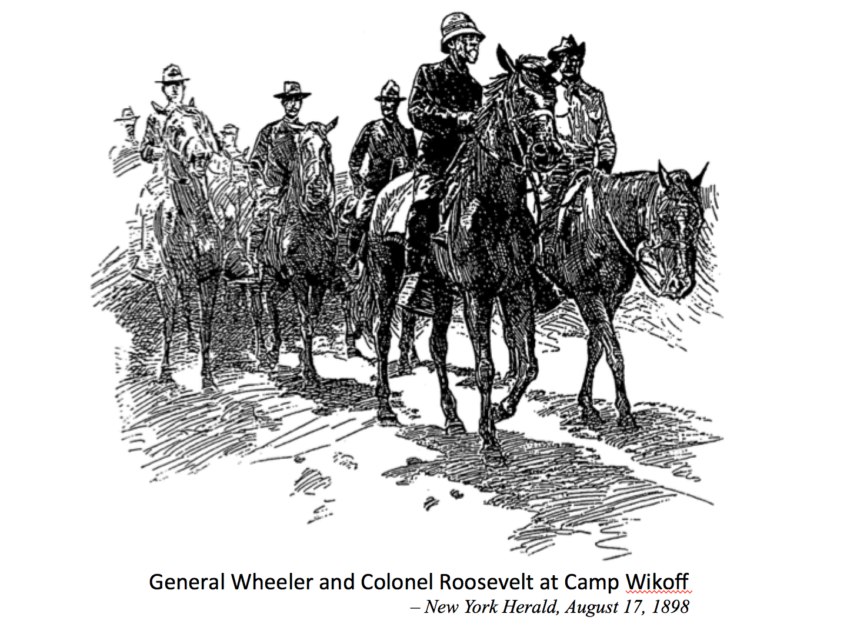
———————————–
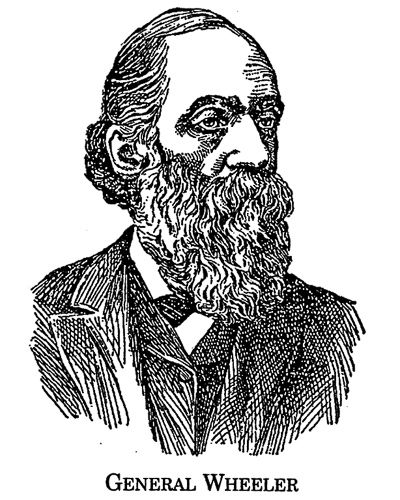
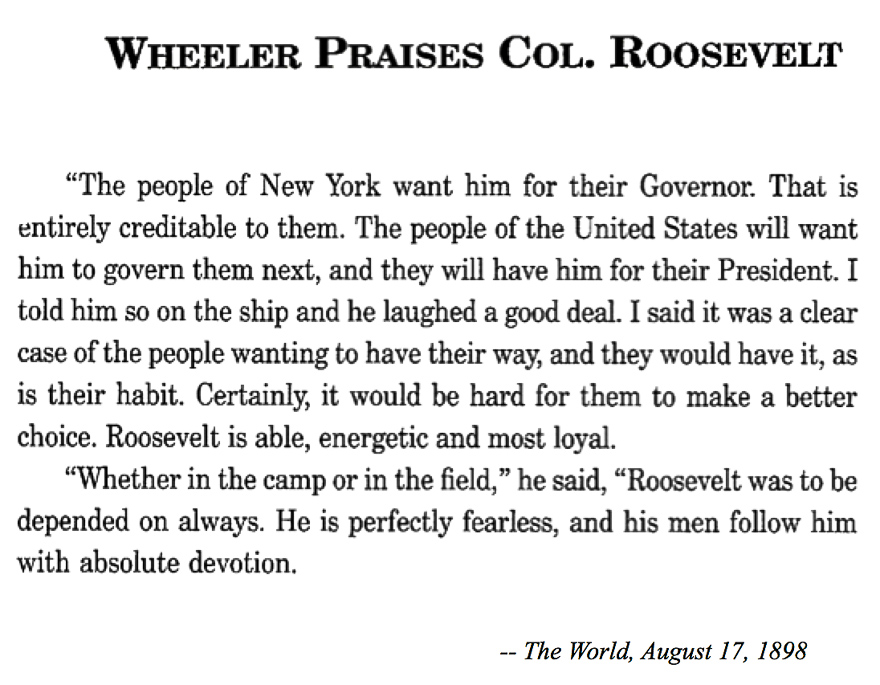
———————————–
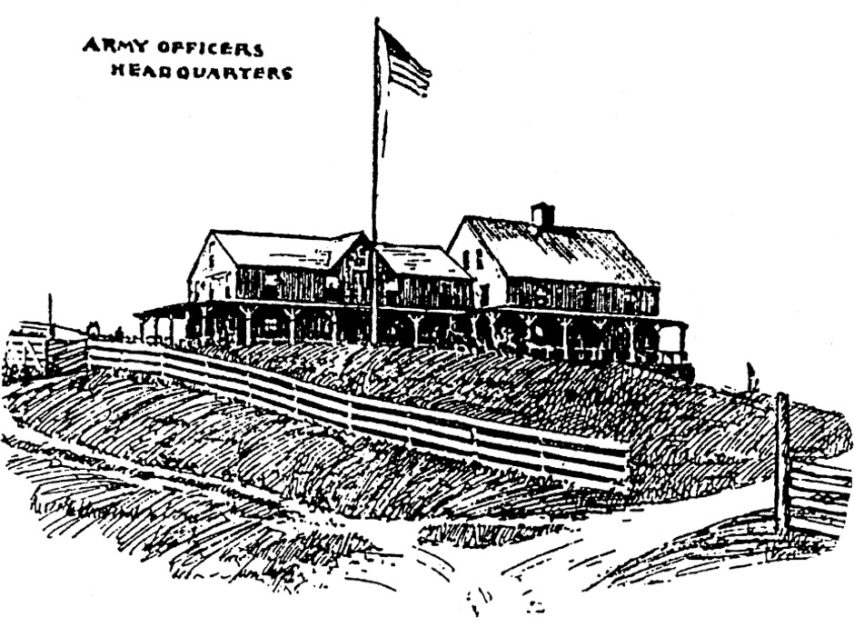
Col. Roosevelt stayed at the Third House on August 18, 1898. His wife, Edith, and his daughters, Alice and Ethel, stayed there as well when they visited Theodore in September — his sons, Theodore & Kermit, slept in their father’s tent at the Rough Riders camp.
———————————–
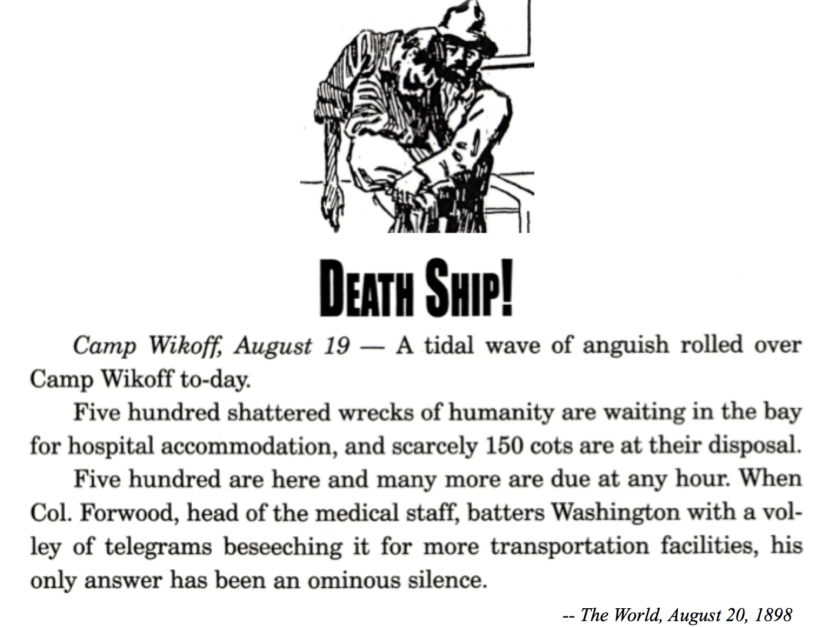
Although the Round Robin protest warned about the condition of the troops in Cuba, the arrival of transports carrying thousands of ill soldiers came as a shock to the nation.
———————————–
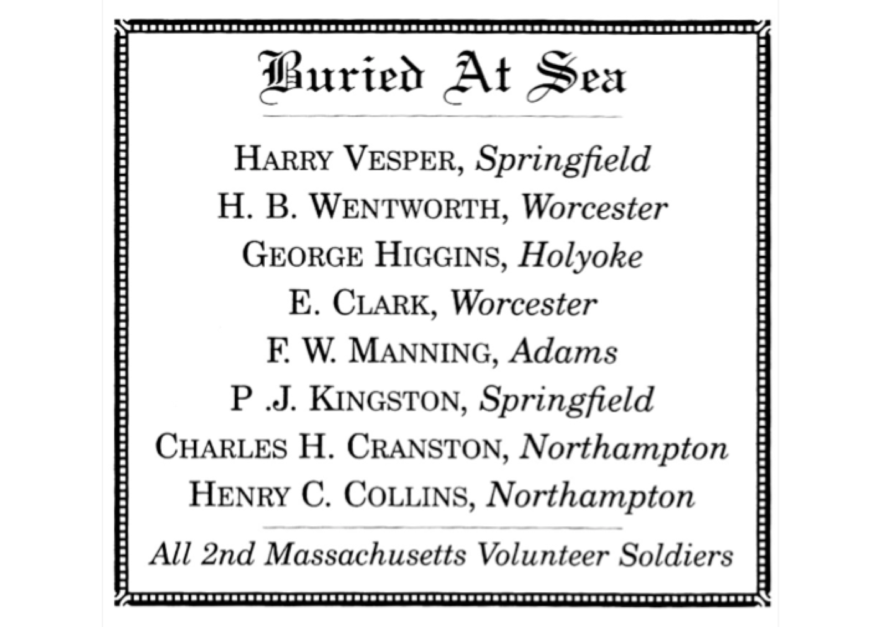
More than sixty soldiers on the transports from Santiago de Cuba, bound for Montauk Point, died on board ship and were buried at sea.
———————————–
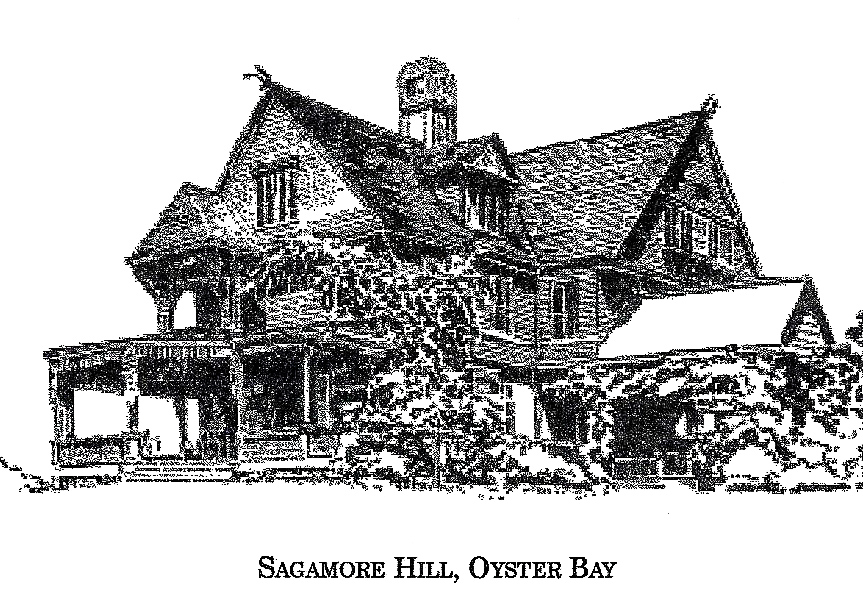
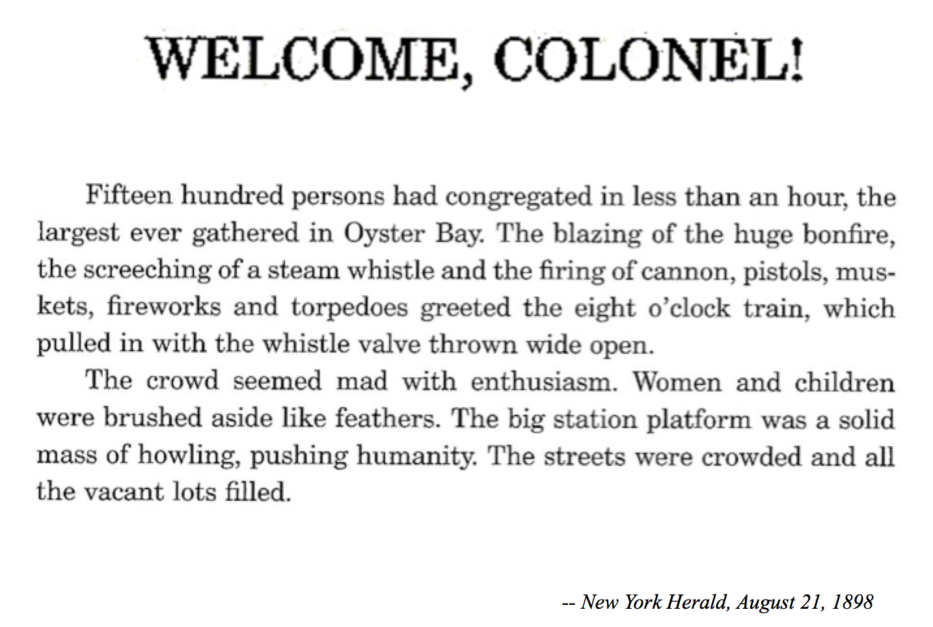
Following his overnight at Third House, Col. Roosevelt was granted a 4-day furlough to return to Sagamore Hill.
———————————–
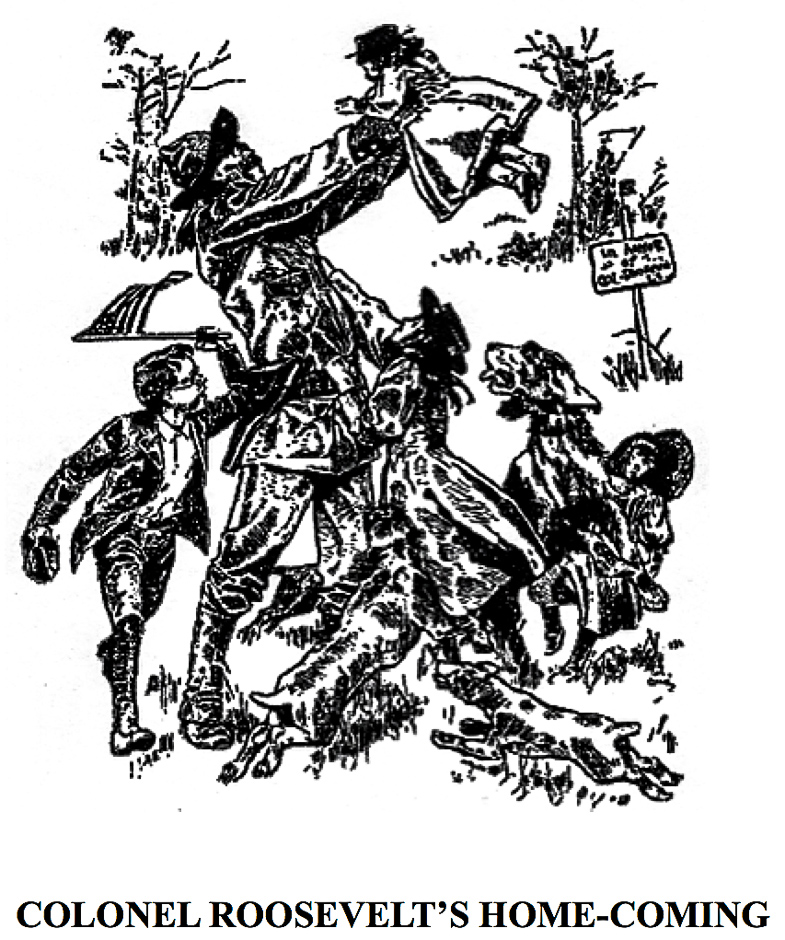
— The World
———————————–

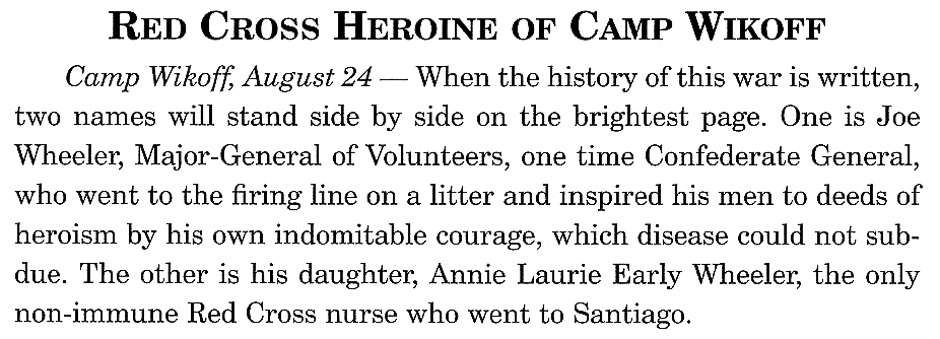
— Report, The World, August 24, 1898 – Annie Wheeler illustration.
———————————–
Thousands of soldiers were in various degrees of ill health at Camp Wikoff, but thousands of soldiers were in good to excellent health, as well.
———————————–
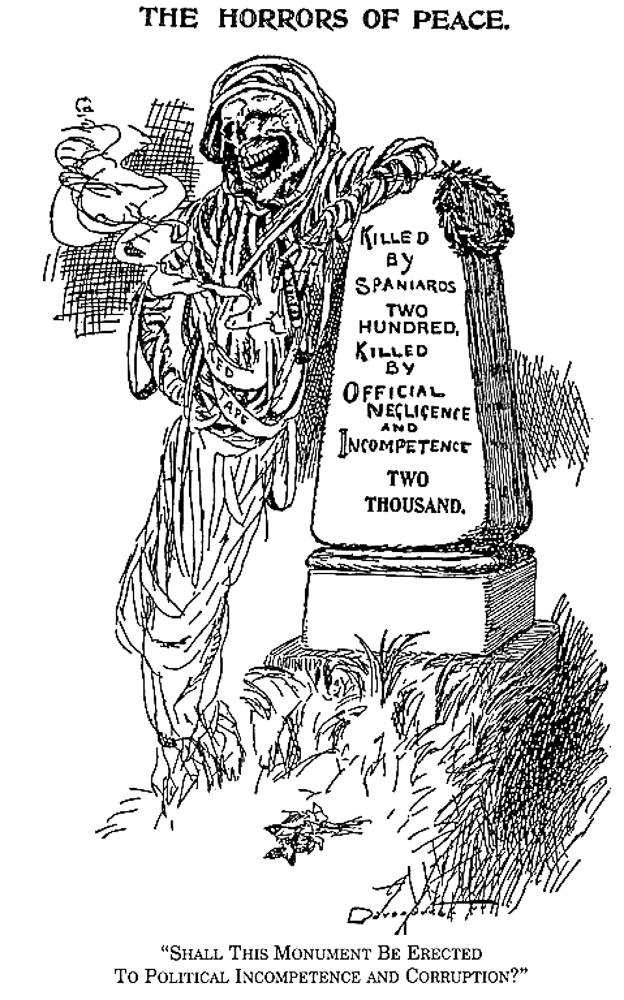
———————————–

———————————–
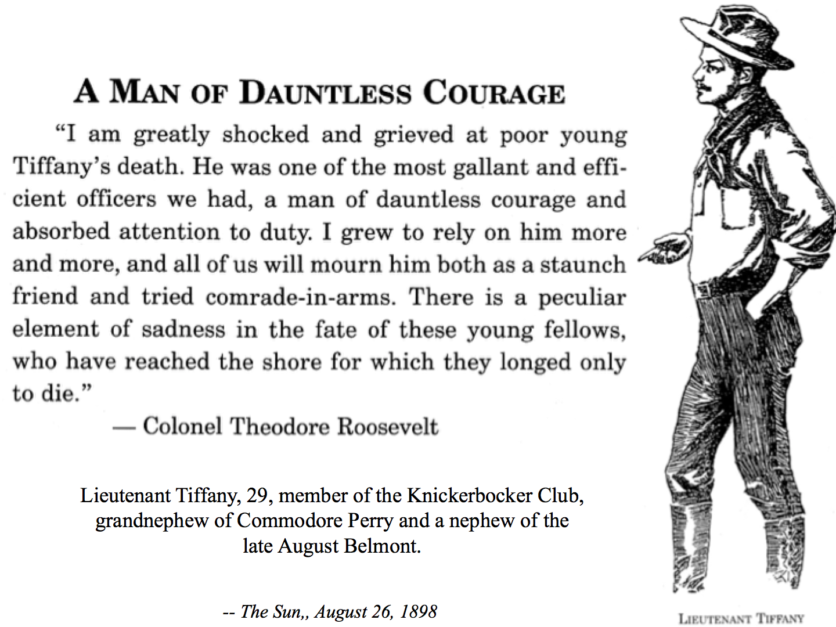
When Col. Roosevelt had last seen Lieutenant Tiffany in Cuba, Tiffany was recovering from malarial fever. The transport north, however, and the delay in Fort Pond Bay — it took six hours to supply the requested provisions — aggravated his condition and he died shortly after arriving in Boston.
———————————–
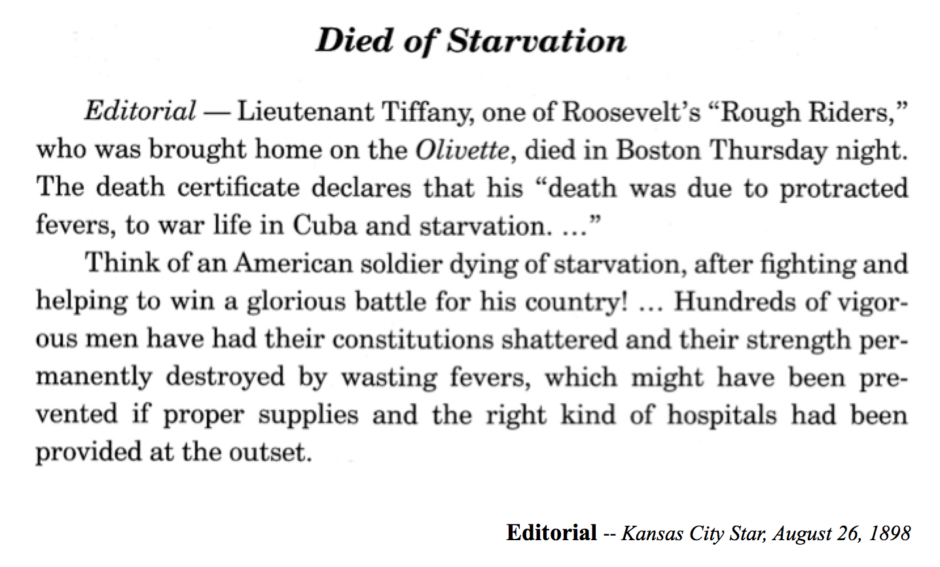
Camp Wikoff was the focus of national attention during its two month existence. Reports & editorials appeared daily in the major newspapers across the country. This editorial expressed the growing outrage at the War Department’s failure to meet the needs of the fever-stricken soldiers.
———————————–
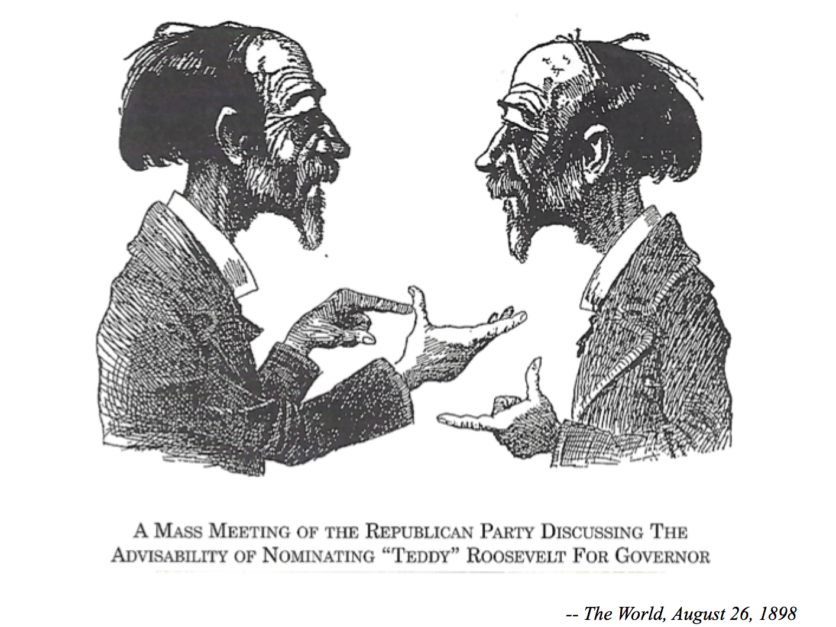
Given the popularity of Col. Theodore Roosevelt, Senator Thomas C. Platt began to re-think his initial opposition to Roosevelt’s nomination as the Republican Gubernatorial candidate. The Republican State Convention was to take place in Saratoga on September 27, 1898. The incumbent Republican Governor, Frank Black, was, however, seeking re-election and had Senator Platt’s support.
———————————–
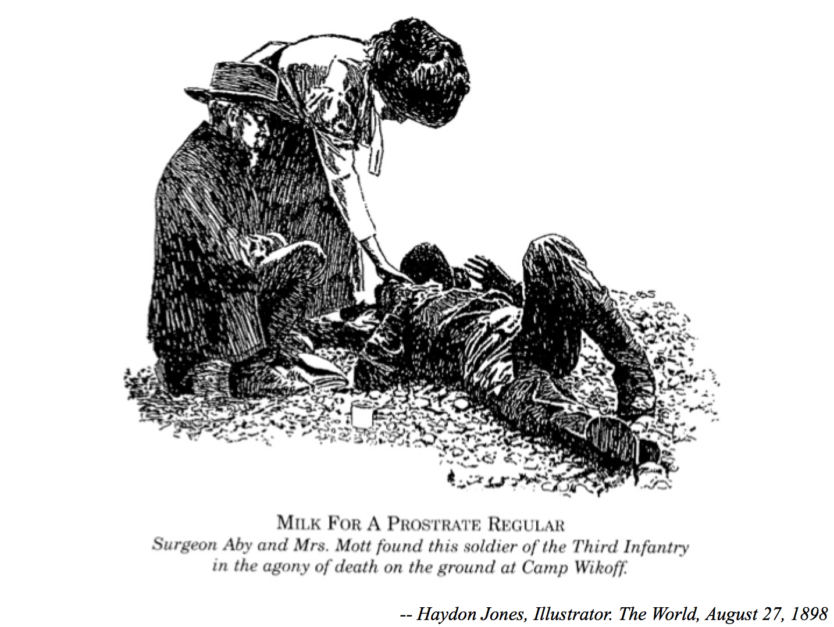
———————————–
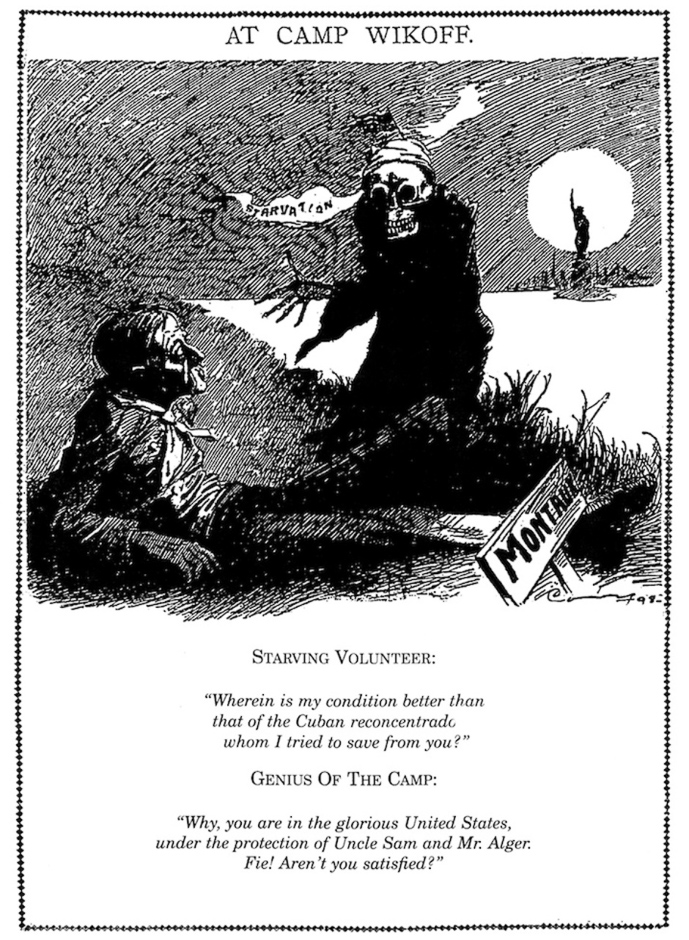
It was difficult for the fever-stricken soldiers and the general public to understand why soldiers were starving at Camp Wikoff, 115 miles from New York City, but the army rations & provisions were indigestible to those suffering from malaria, yellow fever & typhoid at the camp. ‘Food delicacies’ were sent to the camp from various sources on the East End of Long Island, Connecticut & New York City.
———————————–
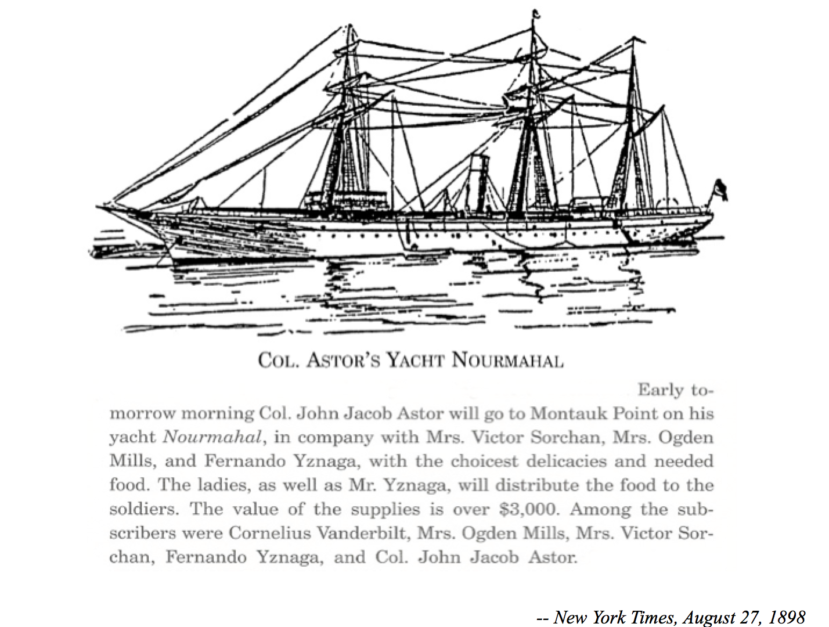
The East Hampton Relief Corps, as well as individuals from the Hamptons and the North Fork, sent ‘food delicacies’ to the camp, where ‘diet kitchens’ were established to distribute those supplies to the soldiers. Fund-raising events were also held at the Maidstone Club in East Hampton.
———————————–
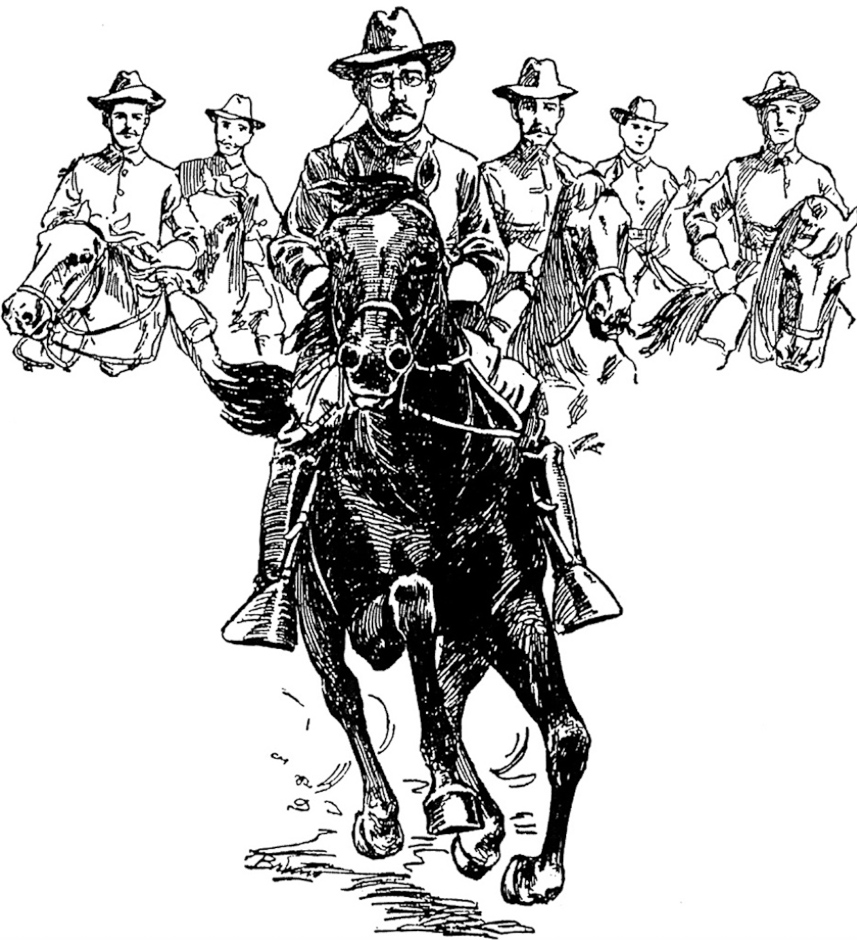
Every afternoon, Col. Roosevelt would lead the charge of his men to the beach at Ditch Plains for a swim in the ocean.
———————————–
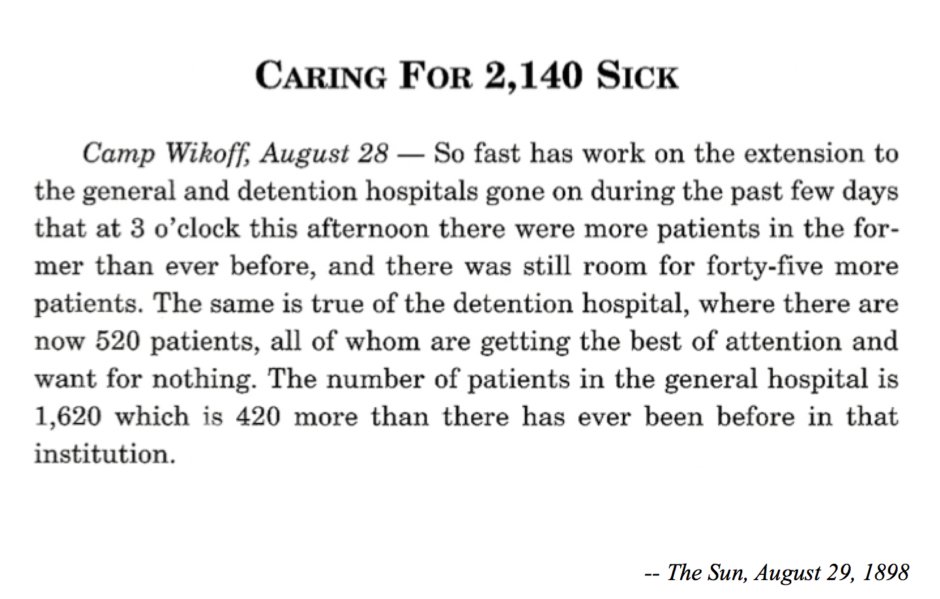
———————————–
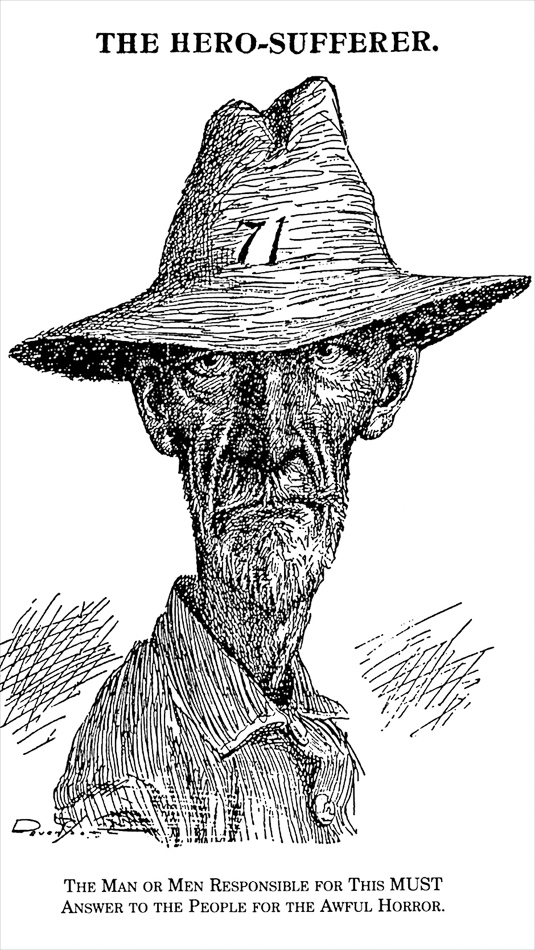
![]()
———————————–
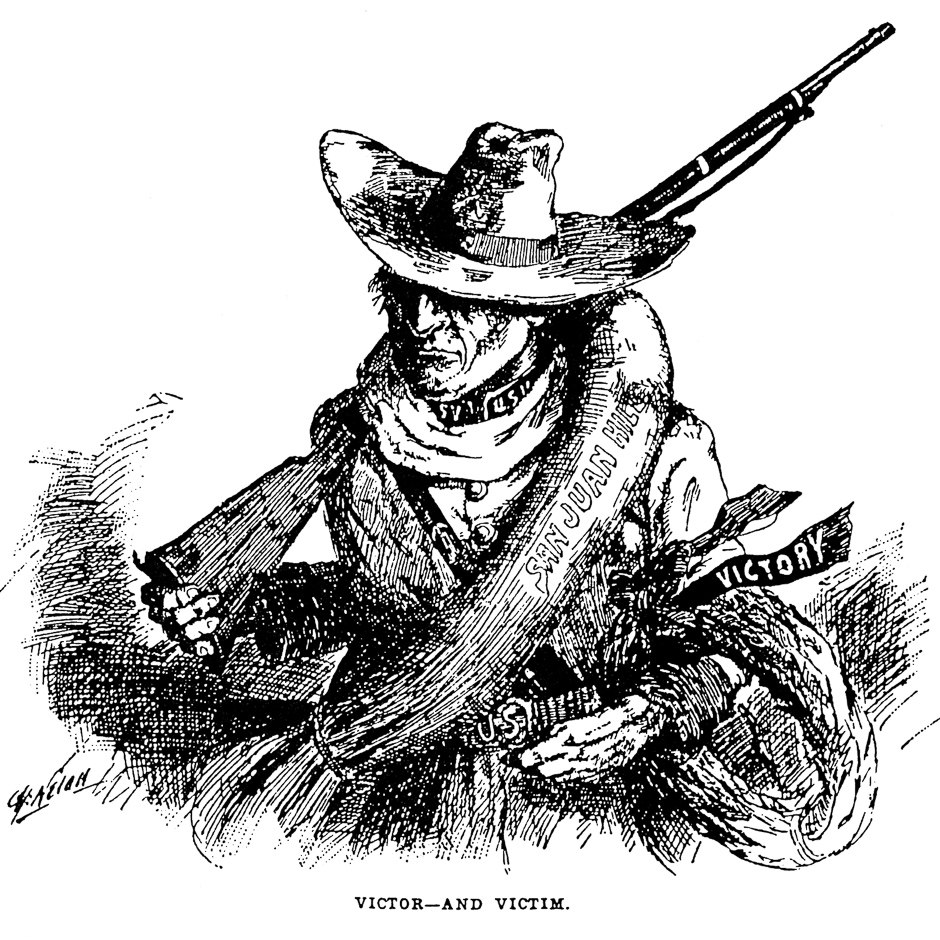
———————————–
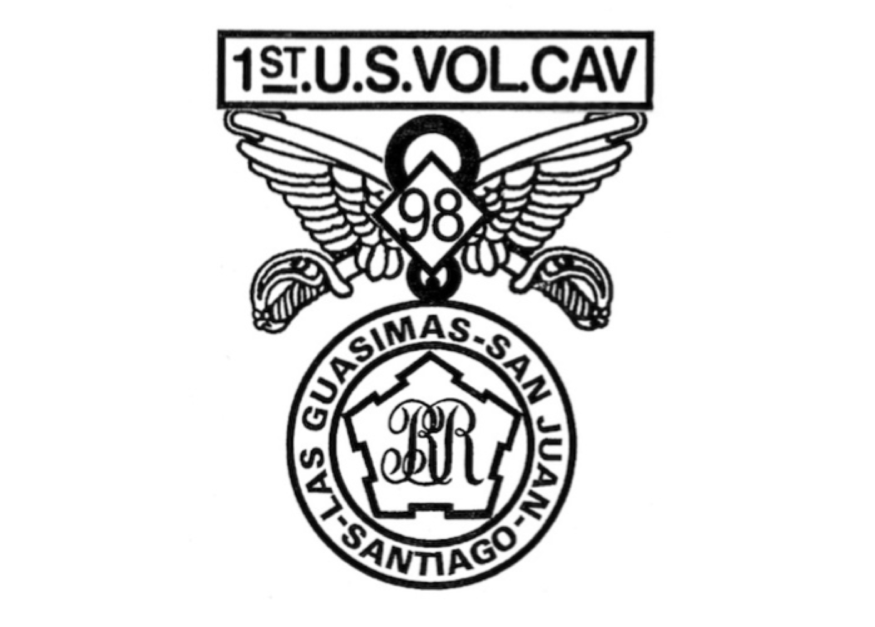
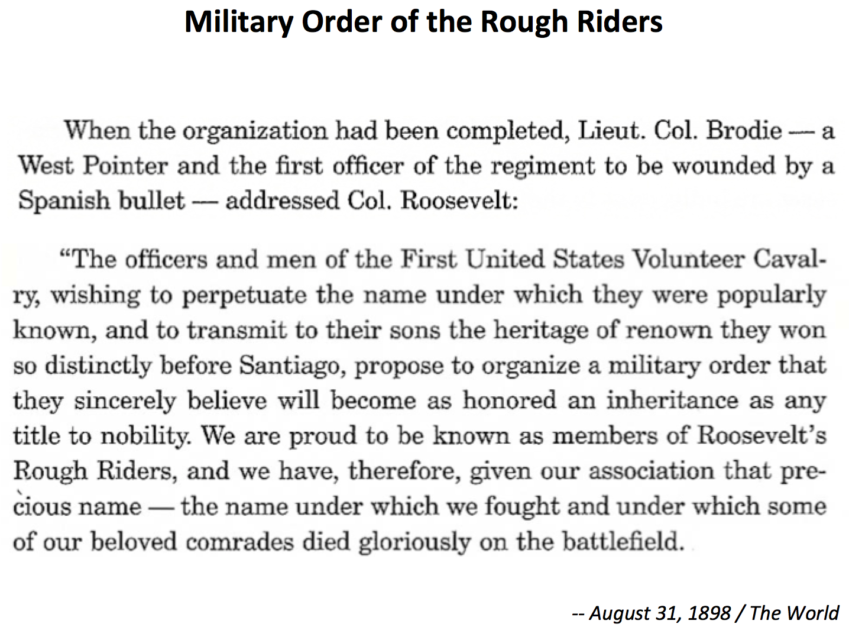
———————————–
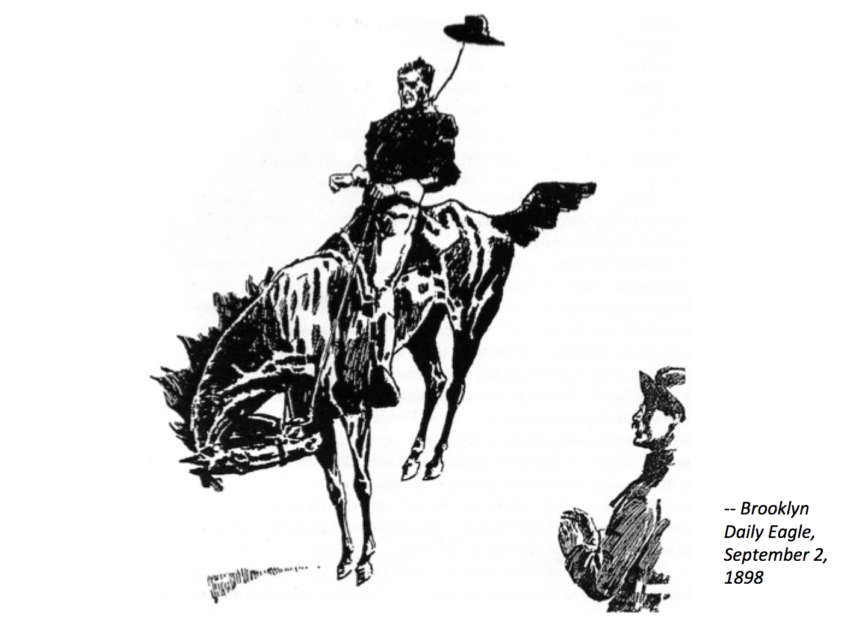
Bronco-busting competitions were held at the Rough Riders’ Camp.
———————————–
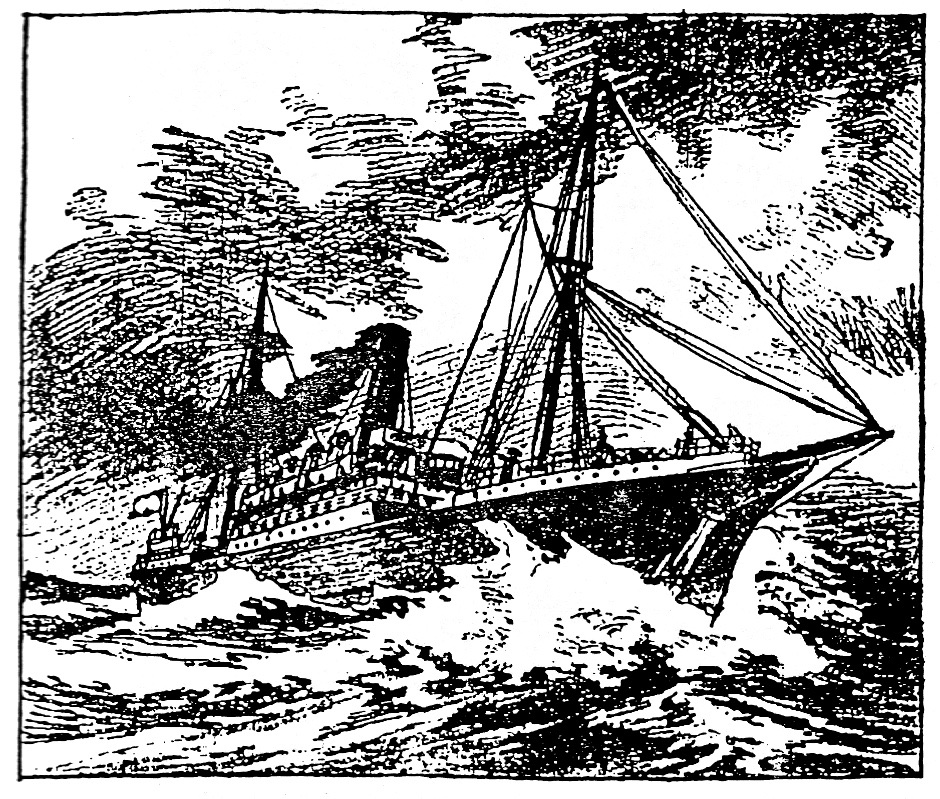
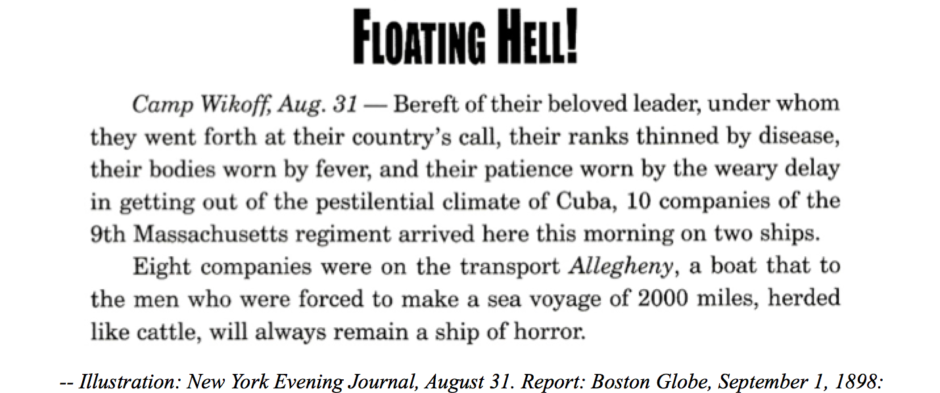
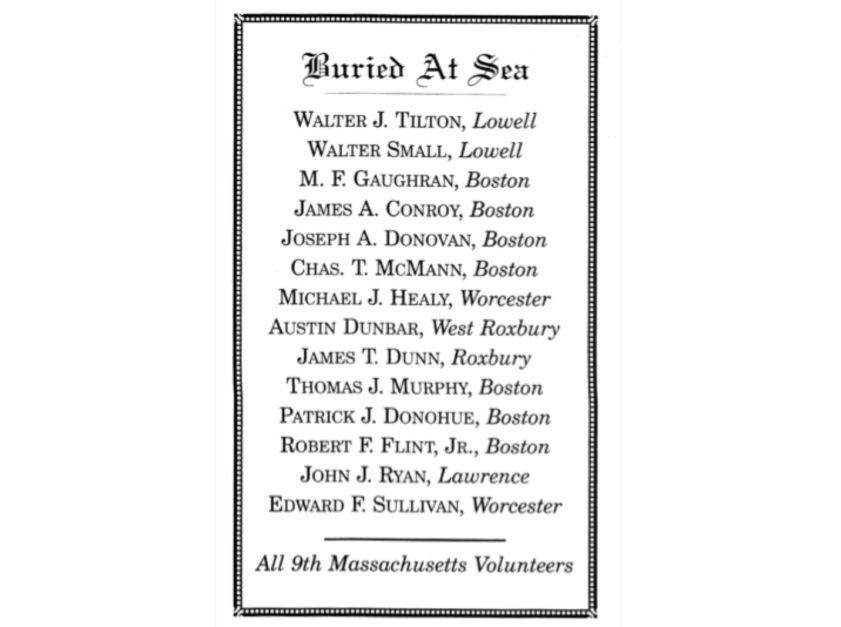
_____________________________________________________________________
For continuation of presentation, please visit:
Camp Wikoff, Col. Theodore Roosevelt & The Rough Riders / Sept 1 – Nov 9, 1898
~~~~~~~~~~~~~~~~~~~~~~~~~~~~~~
Presentation delivered by Jeff Heatley to the Friends of Sagamore Hill
as part of the John A. Gable Lectures, June 20, 2019.
————
Visit: Camp Wikoff National Military Park Proposal
Camp Wikoff, Montauk / August, 1898
Camp Wikoff, Montauk / September & October, 1898
Camp Wikoff, Quarantine Camp, Montauk, 1898
——————–
Presentations based on BULLY! Col. Theodore Roosevelt, The Rough Riders & Camp Wikoff, New York, 1898. A Newspaper Chronicle. Edited & Composed by Jeff Heatley. Published by the Montauk Historical Society & Pushcart Press, 1998.
————————————–
© Presentation, Jeff Heatley, 2019.
~~~~~~~~~~~~~~~~~~~~~~~~~~~~~~~~~~~~~~

_______________________________________________________________


